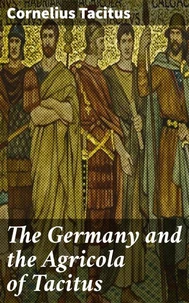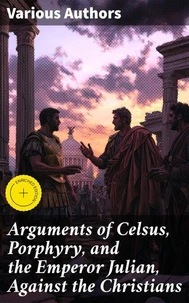The Reign of Tiberius, Out of the First Six Annals of Tacitus. With His Account of Germany, and Life of Agricola
Par : , ,Formats :
Disponible dans votre compte client Decitre ou Furet du Nord dès validation de votre commande. Le format ePub est :
- Compatible avec une lecture sur My Vivlio (smartphone, tablette, ordinateur)
- Compatible avec une lecture sur liseuses Vivlio
- Pour les liseuses autres que Vivlio, vous devez utiliser le logiciel Adobe Digital Edition. Non compatible avec la lecture sur les liseuses Kindle, Remarkable et Sony
 , qui est-ce ?
, qui est-ce ?Notre partenaire de plateforme de lecture numérique où vous retrouverez l'ensemble de vos ebooks gratuitement
Pour en savoir plus sur nos ebooks, consultez notre aide en ligne ici
- Nombre de pages270
- FormatePub
- ISBN859-65--4721052-8
- EAN8596547210528
- Date de parution04/09/2022
- Protection num.Digital Watermarking
- Taille617 Ko
- Infos supplémentairesepub
- ÉditeurDIGICAT
Résumé
In 'The Reign of Tiberius, Out of the First Six Annals of Tacitus, ' Cornelius Tacitus intricately examines the complexities of political power during the reign of Tiberius, highlighting the interplay between morality and governance in ancient Rome. Tacitus employs a fragmented but eloquent narrative style, characterized by piercing insights and a rich vocabulary that evokes the turbulent atmosphere of his subject's era.
This work serves as a crucial part of Tacitus's larger historical narrative, reflecting the moral decay and political stratagems that defined the Julio-Claudian dynasty, while also engaging with broader themes of tyranny and the struggle for personal integrity amidst corruption. Tacitus, a senator and historian of Rome, lived through the very political machinations he describes, providing him with unique insights into the dynamics of power and governance.
His background as both a public official and an observer of Roman life imbues his writing with authenticity and depth. Tacitus's critical perspective, shaped by the tumultuous socio-political landscape of his times, allows readers to appreciate the profound implications of Tiberius's rule. Recommended for historians, classicists, and general readers alike, this compelling examination of Tiberius offers a nuanced understanding of Imperial Rome's complexities.
Readers will find themselves drawn into the intricate web of ambition, betrayal, and the moral dilemmas faced by those in power, marking this work as an essential contribution to the study of Roman history.
This work serves as a crucial part of Tacitus's larger historical narrative, reflecting the moral decay and political stratagems that defined the Julio-Claudian dynasty, while also engaging with broader themes of tyranny and the struggle for personal integrity amidst corruption. Tacitus, a senator and historian of Rome, lived through the very political machinations he describes, providing him with unique insights into the dynamics of power and governance.
His background as both a public official and an observer of Roman life imbues his writing with authenticity and depth. Tacitus's critical perspective, shaped by the tumultuous socio-political landscape of his times, allows readers to appreciate the profound implications of Tiberius's rule. Recommended for historians, classicists, and general readers alike, this compelling examination of Tiberius offers a nuanced understanding of Imperial Rome's complexities.
Readers will find themselves drawn into the intricate web of ambition, betrayal, and the moral dilemmas faced by those in power, marking this work as an essential contribution to the study of Roman history.
In 'The Reign of Tiberius, Out of the First Six Annals of Tacitus, ' Cornelius Tacitus intricately examines the complexities of political power during the reign of Tiberius, highlighting the interplay between morality and governance in ancient Rome. Tacitus employs a fragmented but eloquent narrative style, characterized by piercing insights and a rich vocabulary that evokes the turbulent atmosphere of his subject's era.
This work serves as a crucial part of Tacitus's larger historical narrative, reflecting the moral decay and political stratagems that defined the Julio-Claudian dynasty, while also engaging with broader themes of tyranny and the struggle for personal integrity amidst corruption. Tacitus, a senator and historian of Rome, lived through the very political machinations he describes, providing him with unique insights into the dynamics of power and governance.
His background as both a public official and an observer of Roman life imbues his writing with authenticity and depth. Tacitus's critical perspective, shaped by the tumultuous socio-political landscape of his times, allows readers to appreciate the profound implications of Tiberius's rule. Recommended for historians, classicists, and general readers alike, this compelling examination of Tiberius offers a nuanced understanding of Imperial Rome's complexities.
Readers will find themselves drawn into the intricate web of ambition, betrayal, and the moral dilemmas faced by those in power, marking this work as an essential contribution to the study of Roman history.
This work serves as a crucial part of Tacitus's larger historical narrative, reflecting the moral decay and political stratagems that defined the Julio-Claudian dynasty, while also engaging with broader themes of tyranny and the struggle for personal integrity amidst corruption. Tacitus, a senator and historian of Rome, lived through the very political machinations he describes, providing him with unique insights into the dynamics of power and governance.
His background as both a public official and an observer of Roman life imbues his writing with authenticity and depth. Tacitus's critical perspective, shaped by the tumultuous socio-political landscape of his times, allows readers to appreciate the profound implications of Tiberius's rule. Recommended for historians, classicists, and general readers alike, this compelling examination of Tiberius offers a nuanced understanding of Imperial Rome's complexities.
Readers will find themselves drawn into the intricate web of ambition, betrayal, and the moral dilemmas faced by those in power, marking this work as an essential contribution to the study of Roman history.







